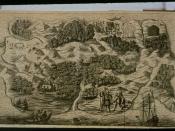The central themes in the novel are the inter-racial relationship, moralism, religion, philosophical and social beliefs. Another interesting subject is the strong spirit of survival through the anxious solitude and struggle of a shipwrecked man who has to face a new life and domain nature.
All through the book a moral sense is constantly kept. It starts when Robinson defies his father's advise, gets in trouble, enslaved, shipwrecked, and in every occasion, he gets and learns the best of it. In fact, Crusoe feels a real sinner; he was never able to see the signs God sent him, however, he receives the grace of God all the time.
As a Puritan soul testing a solitary ordeal, Robinson realises that internal matters in life prevail on external. From this moment onwards, and without feeling homesick or missing his civilised society, basically the protagonist desires to be relieved from his past sins.
The isolation and solitude experienced by Robinson points out the idea of finding a new sense to life through the exploration and exploitation of nature and the creation of a new world.
It also has a strange economic sense. The 18th century belief that God, morality and economics are all somehow one. Robinson Crusoe embodies the conquest of North American people, the domination of nature, the transformation of wilderness into culture, and eventually, the victory.
The rescue of Friday, a "wild creature", supposes to undertake a religious conversion and to educate him into civilised habits. However, Puritans thought that the inhabitants of the New World were to be ignored, killed, or used as servants, as it happens indeed with Friday's father, the cannibals and Friday himself. Contrary to that, the Catholic principle was to convert the savages and to incorporate them into the Christian community, as the only way to...


